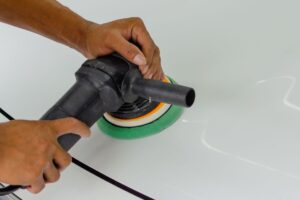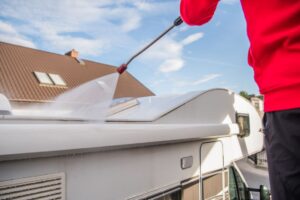Oxidation on fiberglass occurs when the gel coat interacts with oxygen from the air. What can you do to get rid of this unsightly oxidation on your trailer?
Buffing is key to removing oxidation from a fiberglass trailer. You can buff by hand or with a power buffer. Oxidation removers are also effective. Keeping your trailer clean can ward off future oxidation.
This succinct, helpful guide will explain what causes trailer oxidation, delve deeper into how to treat it, and provide preventative tips.
What Is Fiberglass Oxidation and What Causes It?

Oxidation happens when a molecule loses an electron due to a chemical reaction. The lessening of electrons and increase in oxygen can cause fiberglass surfaces to develop a rust-like exterior. Worse yet, the smooth, shiny gel coat begins to lose its luster.
Without the gel coat, you can feel the exposed fiberglass when you touch your trailer. Fiberglass has glass in it, so it can cut you if you’re not careful.
What causes oxidation? Exposure to the air is the primary culprit, which means it’s inevitable in some regards, as your trailer will almost always be outdoors.
However, some factors within your control can accelerate oxidation. Let’s take a closer look.
Excess Water
Do you wash your trailer every day or close to it? Perhaps you live or travel to an area that gets a lot of rainfall? The high rate of water exposure can accelerate oxidation, despite that keeping a clean trailer is key to reducing it.
Air Pollutants
Smoggy, dirty air is poor for your lungs and your trailer. Air pollutants can speed up fiberglass oxidation, leaving you without a gel coat to protect your trailer from the elements. Avoiding travel to areas with known low air quality can help.
Heat
Summertime is prime RVing season, but the heat does more than make you sweat. It can also cause oxidation to accelerate, leaving your trailer looking rusted, corroded, and in poor shape. Its resale value can decline.
Direct Sunlight
Sun exposure is detrimental to a trailer in many ways. It can cause the exterior paint to fade and make your trailer look terribly oxidized on top of that.
Removing Oxidation from a Fiberglass Trailer – All Your Options
Now that you understand what can cause a fiberglass trailer to oxidize, what are your options for removing the unappealing rust-like substance coating your vehicle? Here’s an overview.
Hand Buffing
Hand buffing is useful for moderate oxidation that hasn’t spread to the whole trailer. You only need a scrub sponge and a polishing compound.
I like Star Brite’s premium RV polish. It comes in a 32-ounce container so a little goes a long way. The formula includes bonding polymers that stick to the fiberglass of your trailer and prevent grease, grime, and dirt from staining your vehicle.
It’s supposed to last for a year, so you won’t have to think about reapplying the polish for a while.
So how do you hand buff your fiberglass trailer? Apply the polish to the oxidized spots on your trailer, working it in there with a scrub sponge. You can use a standard kitchen sponge for this, but not the scratchy side.
Let the polish dry. It will leave a bit of a residue, which is fine. Rub at that with a soft cloth and you should see a shiny fiberglass surface.
Power Buffing

A power buffer is a simple tool you might have in your garage already. Some of them plug in, and others run on batteries.
The Torq 10FX rando orbital polisher reduces vibrations so it’s easy to use for hours.
It’s also built light so you can cover the entire vehicle without achy arms and hands. Speed control buttons let you set the degree of buffing, and with a digital display, you can easily tell which speed setting you’ve selected so you can use it again the next time.
Requiring only 110 volts, this RV-friendly power buffer will make a difference in your oxidized trailer.
Use the 10FX buffer with polish for best results. The buffer will spread the polish and knock out oxidation in a one-two punch of effectiveness. Your trailer will look great.
If you like to finish your trailer maintenance with a bit of wax, a power buffer can also spread the wax.
Alternatively, you can power-buff with a polish and scrub sponge. However, this method takes a long time and requires substantial elbow grease to work as effectively as an electric power tool.
Oxidation Remover
You can also try an oxidizer remover. You can find many of these on the market, but one of my favorites is Meguiar’s marine/RV one-step compound. This product polishes your trailer and removes oxidation concurrently.
The compound can renew the color to your trailer’s exterior, return its shine, and remove water spots, stains, scratches, and heavy oxidation. You can use it on untreated or gel coat fiberglass and apply it by hand or use a power buffer.
Wet Sanding
What if you have such severe fiberglass oxidation that the measures you’ve taken have been less effective than projected? Fiberglass can become far worse for wear as it ages or if it is exposed to many outdoor elements.
Wet sanding can help. Purchase sandpaper with a grit range between 600 and 2,000. Saturate it in water for 24 hours, then put it on a foam block and use the block to sand the fiberglass until it feels smooth.
Next, apply polish and repeat as needed until your trailer looks less oxidized.
Tips for Preventing Trailer Oxidation
You treated the oxidation that marred your trailer, which is great! However, it can come back if you’re not careful. These tactics will help you ward it off.
Limit Exposure to the Elements
Don’t leave your trailer sitting out in the rain or direct sunlight. Park it somewhere, such as a covered garage, or store it in a facility.
Even parking the vehicle under an awning or any other form of cover will prevent environmental damage that can wreak havoc on the fiberglass.
Clean Your Trailer Often

Prevent oxidation from rearing its ugly head by bathing your trailer monthly. Use your favorite trailer cleaner, suds it up, and wash your vehicle from head to toe. You can cut back on washing the trailer if you winterize it.
Wax Your Trailer
When you finish cleaning your trailer, wax its fiberglass exterior. You can use a product like Meguiar’s or your favorite automotive shine. Confirm the product is intended for waxing gel-coated fiberglass.
Select an RV-grade or marine-grade wax.
Bottom Line
Fiberglass oxidation is unappealing, as it ages your trailer and reduces its resale value. Fortunately, it’s easy to remove oxidation–even extreme oxidation–and renew the look of your trailer. It’s also simple to maintain your vehicle to keep it free of oxidation.
